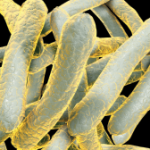Another treatment that may cause stomachs to churn concerns the use of fecal transplants. For many hospitalized patients, Clostridium difficile infection can be a serious, and even fatal, infection. This bacteria colonizes the human intestinal tract after the normal gut flora have been altered by antibiotic therapy, so one group of investigators devised a novel treatment that avoids the use of additional antibiotics. They developed a protocol whereby they transplant fecal microbiota from healthy donors into the bowels of infected individuals using a colonoscopy procedure. A multicenter study recently confirmed the efficacy of this approach, reporting a cure rate of over 90%, far exceeding the results using standard therapies.6 Reading the authors’ description of their methodology reminds me why I am not a gastroenterologist: “Stool was suspended in non-bacteriostatic saline and mixed by hand or with a blender until the consistency was such that the suspension could be aspirated into 60 cc catheter-tipped syringes and injected via the biopsy channel of a colonoscope. Before aspiration, the fecal suspension was filtered through gauze pads to remove large particulate matter to achieve an appropriate consistency, which approached that of malted milk.” This is information overload! No doubt your System 1 is now fully activated, thinking fast, and commanding you to move on.
The TNF Story—In Reverse
As rheumatologists, we are accustomed to viewing tumor necrosis factor (TNF) as an “evil” cytokine that activates immune cascades, resulting in damaged joint tissue. But TNF has many other functions that are highly beneficial. Its name belies its important role in destroying cancer cells. TNF is responsible for maintaining host immunity to tuberculosis (TB). It has also been observed that, in type I diabetics, TNF destroys T cells that are autoreactive to insulin. Yet, clinical trials using higher doses of TNF therapy have been hampered by the cytokine’s systemic toxicity. One solution would be to find a surrogate that, when administered, would induce TNF production safely. BCG, derived from an avirulent strain of mycobacterium, is known to promote TNF production and has been formulated into a vaccine form (Food and Drug Administration approved) that can be safely administered to humans. BCG therapy has been previously used to treat melanoma and bladder cancer, but its use as a stimulator of the innate immune system in the treatment of autoimmune diseases has been limited to rodent models of diabetes.
A recent proof-of-concept study led by Denise L. Faustman, MD, PhD, associate professor of medicine at Harvard Medical School in Boston, concluded that BCG treatment transiently modified the autoimmunity that underlies type 1 diabetes.7 Patients with longstanding diabetes were vaccinated with BCG and it was observed that the majority of insulin-autoreactive T cells released into the blood following the treatment were dead. Regulatory T cells were induced following vaccination, autoantibody levels declined, and the fasting level of insulin secretion temporarily increased.


